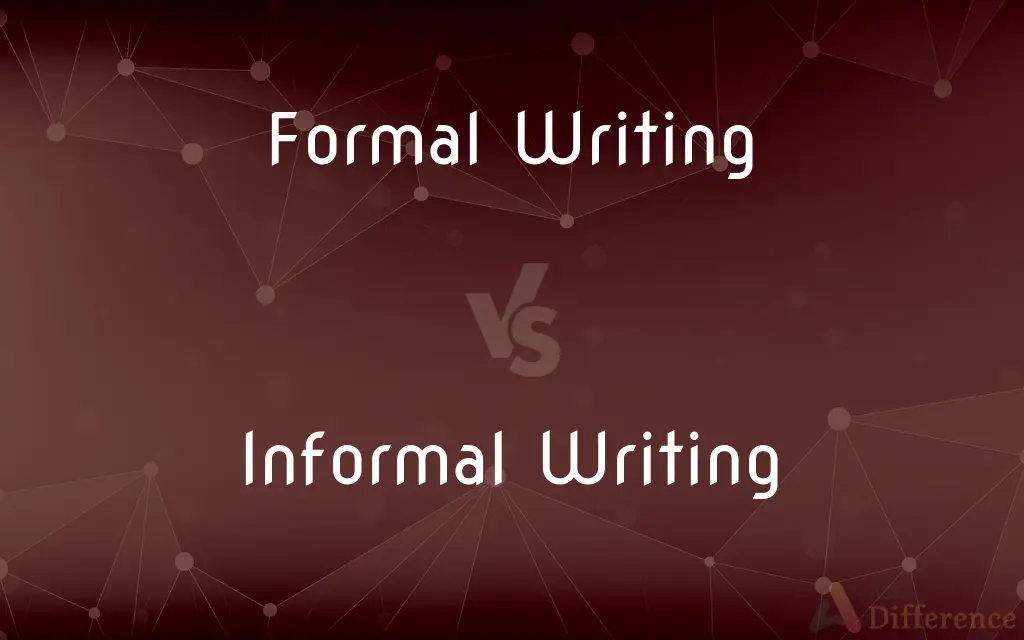Formal Writing vs. Informal Writing — What's the Difference?
By Tayyaba Rehman — Published on November 18, 2023
Formal Writing adheres to established conventions and is often used in professional or official contexts, while Informal Writing uses a relaxed tone, often seen in personal communications.

Difference Between Formal Writing and Informal Writing
Table of Contents
ADVERTISEMENT
Key Differences
Formal Writing typically follows strict rules of grammar, punctuation, and syntax, ensuring clarity, precision, and a degree of sophistication. It is structured and avoids slang or colloquialisms. Conversely, Informal Writing has a more relaxed approach, often using contractions, colloquial terms, and even regional dialects or slang to convey a message.
The usage of Formal Writing is commonly seen in academic papers, official reports, business communications, and any scenario where the message needs to be clear and devoid of ambiguity. Informal Writing, on the other hand, is prevalent in personal letters, text messages, or any other medium where personal expression outweighs strict adherence to formal language conventions.
Vocabulary choice is another distinguishing factor. Formal Writing would opt for more sophisticated and precise words, while Informal Writing might use simpler words or even slang. For instance, Formal Writing might use "commence" while Informal Writing might just say "start."
Pronouns also play a role in the distinction. Formal Writing might avoid the first person to maintain an objective stance, while Informal Writing freely uses first-person pronouns like "I" and "we." Additionally, Informal Writing may address readers directly or use rhetorical questions, making the writing feel conversational.
Lastly, the purpose often dictates the style. While Formal Writing aims to inform, persuade, or convey in an authoritative manner, Informal Writing seeks to relate, express, or casually inform without the constraints of formal conventions.
ADVERTISEMENT
Comparison Chart
Grammar & Syntax
Strict adherence to rules
Relaxed; allows contractions, colloquialisms
Usage
Academic, official, business communications
Personal letters, texts, casual communications
Vocabulary
Sophisticated, precise words
Simpler, direct words; may include slang
Pronoun Use
May avoid first person
Freely uses "I", "we", and direct address
Purpose
Inform, persuade, authoritative conveyance
Relate, express, casual inform
Compare with Definitions
Formal Writing
Prioritizes clarity, precision, and authority.
Legal documents require the precision of Formal Writing.
Informal Writing
Writing style characterized by a relaxed tone and personal touch.
Her diary was filled with the candor of Informal Writing.
Formal Writing
Communication style used in professional or official contexts.
The company’s annual report is an example of Formal Writing.
Informal Writing
Allows the use of slang, contractions, and colloquialisms.
Blogs often have the charm of Informal Writing.
Formal Writing
Avoids slang, colloquialisms, and contractions.
The scientific journal demands the rigor of Formal Writing.
Informal Writing
Can be subjective and emotion-driven.
Personal essays shine with the authenticity of Informal Writing.
Formal Writing
Writing that adheres to strict linguistic and structural standards.
Her thesis was a masterpiece of Formal Writing.
Informal Writing
Reflects conversational speech and personal views.
Her letter to her friend was filled with the warmth of Informal Writing.
Formal Writing
Objective and impersonal in tone.
News reports should exhibit unbiased Formal Writing.
Informal Writing
Used primarily for casual or personal communication.
Text messages are often examples of Informal Writing.
Common Curiosities
Can I include slang in Informal Writing?
Yes, slang is acceptable in Informal Writing, especially when reflecting conversational speech.
In what scenarios is Formal Writing typically used?
Formal Writing is used in academic, business, and official contexts like research papers, business communications, and legal documents.
Can I use contractions in Formal Writing?
It's generally advised to avoid contractions in Formal Writing for clarity and formality.
Is one style better than the other?
Neither is universally "better"; the appropriateness depends on the context and purpose of the writing.
Where might I encounter Informal Writing?
Informal Writing is often found in personal letters, text messages, blogs, and casual communications.
Can a formal document contain any Informal Writing?
While predominantly formal, some documents might have informal sections, like a CEO's personal note in an annual report.
How can I improve my Formal Writing skills?
Study formal documents, expand your vocabulary, and practice writing while adhering to linguistic and structural standards.
Are colloquialisms permitted in Formal Writing?
Generally, colloquialisms are avoided in Formal Writing to maintain clarity and professionalism.
Is it okay to switch between Formal and Informal Writing in a piece?
Consistency is key, so it's generally advisable to maintain a consistent tone throughout a piece.
Can Informal Writing be used in professional settings?
Yes, in certain contexts like casual internal communications or when relating to a familiar audience.
Share Your Discovery

Previous Comparison
Norm-Referenced Testing vs. Criterion-Reference Testing
Next Comparison
Bell Peppers vs. CapsicumAuthor Spotlight
Written by
Tayyaba RehmanTayyaba Rehman is a distinguished writer, currently serving as a primary contributor to askdifference.com. As a researcher in semantics and etymology, Tayyaba's passion for the complexity of languages and their distinctions has found a perfect home on the platform. Tayyaba delves into the intricacies of language, distinguishing between commonly confused words and phrases, thereby providing clarity for readers worldwide.












































